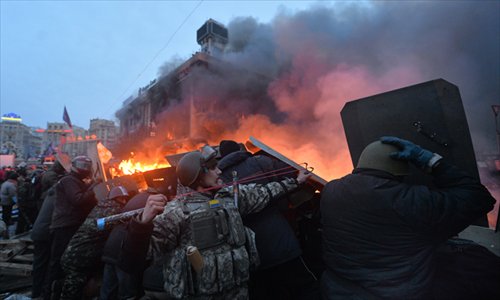Ukraine on terror lockdown

An anti-government protester uses a slingshot during clashes with the police on Independence Square in Kiev early on Wednesday. Protesters, many of them masked and in battle fatigues, braced on Wednesday for a fresh assault by riot police in central Kiev after a day of clashes. Photo: AFP
Ukraine has announced a nationwide "anti-terrorist" operation in response to Tuesday's deadly clashes between protesters and police, which left at least 26 people dead, as Western countries push for sanctions.
The situation in Ukraine has become a tug-of-war between the West and Russia and sanctions would only worsen the situation, analysts say.
Ukraine's health ministry said 26 people, including 10 police officers, died in clashes on Independence Square in Kiev since Tuesday morning and more than 240 were in hospital.
"The National Security Service and Ukrainian Anti-Terrorist Center have taken the decision to conduct an anti-terrorist operation across the territory of Ukraine," Ukraine's security agency head Oleksandr Yakimenko said in a statement on Wednesday.
EU foreign policy chief Catherine Ashton summoned the 28-nation bloc's foreign ministers for emergency talks on Ukraine on Thursday. Ashton said in a statement Wednesday that the bloc would consider sanctions against those said to be responsible.
The foreign ministers of France, Germany and Poland will travel to Kiev on Thursday to assess the situation before the meeting in Brussels to decide whether to impose the sanctions, French Foreign Minister Laurent Fabius said on Wednesday alongside US Secretary of State John Kerry in Paris.
Kerry said the US was discussing with its allies the possibility of sanctions against those responsible for the violence and said there was still time to reach a compromise.
Addressing a news conference with French President Francois Hollande in Paris, German Chancellor Angela Merkel said Wednesday the threat of sanctions was meant to show Kiev that the EU is serious about the need for a return to political dialogue.
The protests, which erupted after Ukraine's government rejected a landmark trade deal with the EU in favor of closer relations with Russia, have shifted from its original cause to carefully plotted moves that target the overthrow of the government, Chen Yurong, director of the Department for European-Central Asian Studies at the China Institute of International Studies, told the Global Times.
The crisis came this far due to the tug-of-war between the West and Russia, and in the meantime Ukraine's domestic political struggle also added to the complexity of the situation, Chen said.
As EU leaders condemned Kiev for the escalating violence in Kiev, Russian President Vladimir Putin held an overnight telephone conversation with Ukrainian President Viktor Yanukovych, calling the event a "coup attempt" and blamed the Ukrainian opposition for the deadliest day since the country gained independence.
"In the president's opinion, all the responsibility for what is happening now in Ukraine lies specifically with extremists," Kremlin spokesman Dmitry Peskov said Wednesday.
He deflected questions about the release of the second installment of a $15 billion bailout package for Ukraine, saying the main priority was to end the upsurge in violence.
"Ukraine is not able to get rid of Russia's influence and it sees more substantial benefits from closer ties with Russia as the EU itself has just been recovering from the debt crisis and could offer no big help to the country," said Li Xing, a professor of Russian and Asian studies with Beijing Normal University.
Russian Finance Minister Anton Siluanov said on Monday that Moscow would buy $2 billion of Ukrainian eurobonds this week.
Yanukovych warned on Wednesday that he could deploy force against his opponents after he accused them of an attempt to "seize power" by means of "arson and murder."
In a statement posted online, Yanukovych emphasized that he had refrained from violence since the unrest began and had persistently offered dialogue and the possibility of elections. But he said he was being pressed to take a harder line.
The crisis may remain in a stalemate over a long period as both sides have a strong power base, Li said, noting that ousting the president won't bring an end to the violence but instead trigger worse consequences.
"If the West really intends to end the turmoil, they shouldn't keep pressuring Kiev, which will exacerbate the situation. The ultimate solution must be dialogue," Chen said.
Agencies contributed to this story